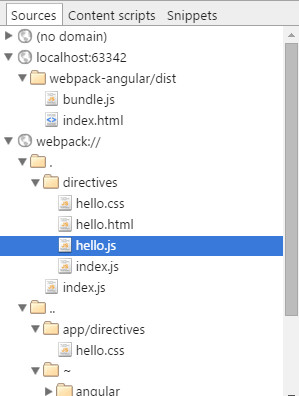[AngualrJS + Webpack] Production Source Maps
When you uglify your Angular code with Webpack's uglify plugin, debugging your application can be a nightmare. See how easy it is to add source maps to your bundle so you can easily debug even in production.
Add source map to the production:
if(process.env.NODE_ENV === "production"){ config.output.path = __dirname + "/dist"; config.plugins.push(new webpack.optimize.UglifyJsPlugin()); // Uglify js config.devtool = 'source-map'; }
var webpack = require('webpack') path = require('path'); path.resolve(__dirname, "app"); var config = { context: __dirname + '/app', entry: './index.js', output: { path: __dirname + '/app', filename: 'bundle.js' }, plugins: [ new webpack.DefinePlugin({ ON_TEST: process.env.NODE_ENV === "test" }) ], module: { loaders: [ {test: /\.js$/, loader: 'ng-annotate-loader!babel-loader', exclude: /node_modules/}, {test: /\.html$/, loader: 'html-loader', exclude: /node_modules/}, {test: /\.css$/, loader: 'style!css', exclude: /node_modules/}, {test: /\.styl/, loader: 'style!css!stylus', exclude: /node_modules/} ] } }; if(process.env.NODE_ENV === "production"){ config.output.path = __dirname + "/dist"; config.plugins.push(new webpack.optimize.UglifyJsPlugin()); // Uglify js config.devtool = 'source-map'; } module.exports = config;




 浙公网安备 33010602011771号
浙公网安备 33010602011771号